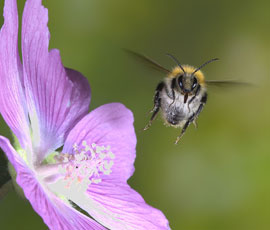Bayer: Latest bee study is seriously flawed

Bayer CropScience has rubbished claims that a commonly used crop pesticide is responsible for the global decline of bees.
The study, by scientists from the Harvard School of Public Health in the USA, claimed to have established a link between the neonicotinoid imidacloprid and bee colony collapse.
Harvard researchers exposed bees with levels of the pesticide “determined to reflect imidacloprid residues reported in the environment previously”. They discovered that the bees subsequently abandoned their hives.
The study, which is due to appear in the June issue of The Bulletin of Insectology, follows two recently published studies in Britain and France, which strongly suggested a link between neonicotinoid pesticides and the decline of bees.
But according to Bayer, the research is “factually inaccurate and seriously flawed, both in its methodology and conclusions”.
Bayer said the symptoms observed between bees and the use of imidacloprid were not “not consistent with, or even remotely similar to” those of colony collapse disorder, a phenomenon which sees healthy bees leave their hives en masse.
The study’s flaws, according to Bayer, include the following:
- The imidacloprid concentrations selected for testing were NOT based on measured residues in high fructose corn (maize) syrup (HFCS), but on a series of implausible and unsubstantiated assumptions
- The study bees were fed HFCS spiked with different levels of imidacloprid that were far above real-world exposure levels
- In separate research, analysis from actual field grown maize samples, have shown no detectable imidacloprid residues in HFCS
- The study lacked replication of test colonies within apiaries [bee yards] and the total number of colonies per treatment group were too few to allow a meaningful statistical analysis of colony survival
- The authors ignored the scientific consensus that bee health is impaired by multiple factors, including inadequate diet, pests and parasites such as the varroa mite, microbial diseases, mismanaged colonies, and loss of genetic diversity.
In addition, Bayer said that the study authors had wrongly assumed the majority of maize grown in the US has been treated with imidacloprid. But in actual fact, over the last eight years, the annual percentage of total maize acres in the US treated with imidacloprid has been less than 0.5%.
“Thus, the suggestion that imidacloprid is affecting honey bee health via residue found on maize or through maize products is also grossly inaccurate,” said the company’s statement.
The German agrichemical giant insisted that imidacloprid and neonicotinoid insecticides, generally, were “safe and effective management tools” to control a wide range of crop pests.
“Throughout the many years that imidacloprid has been commercially available and used, there has been no credible scientific evidence demonstrating a link between this active ingredient – or other neonicotinoids – and increases in honey bee colony losses and declining honey bee colony health,” said the company. “This latest study is no exception.”
Imidacloprid, created by Bayer in the early 1990s, was one of the first neonicotinoids and it has been used on millions of acres of crops, especially in the USA.
DEFRA said it was monitoring all the new research into neonicotinoids, but had so far concluded that they “do not present any new evidence”.
“The UK has a robust system for assessing risks from pesticides and all the evidence shows neonicotinoids do not pose an unacceptable risk when products are used correctly,” said a DEFRA spokesman.

